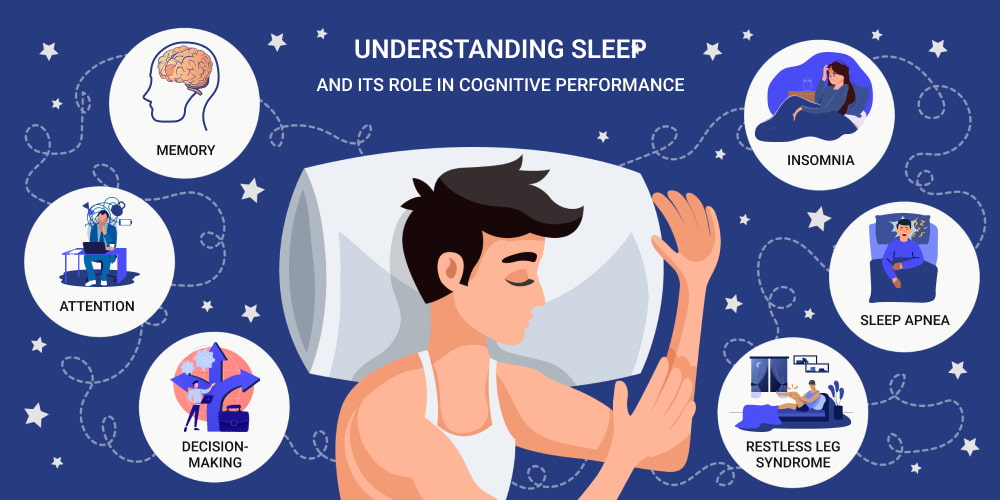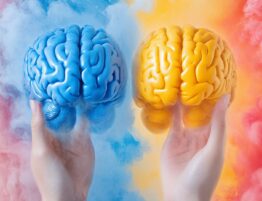Maintaining good health is fundamental to wellbeing and success. Every person takes care of their health by following a diet, exercising, and getting a good night’s sleep. Sleep is fundamental to our physical health and brain function. It has a direct effect on our nervous system and is responsible for mood. Our well-being, concentration, and ability to solve various problems depend on sleep quality. Sleep is key to the long-term health of our body. Its lack affects cognitive impairment and neurological disorders. Without proper rest, a person is subsequently exposed to various degenerative disorders.
The brain tries to perform all functions and loses its ability to work fully. This creates an increased risk of dangerous neurological diseases. Sleep disorders initially cause anxiety, depression, and problems with mental state. A person may suffer from sleep apnea and restless legs syndrome. The effects accumulate over time and can significantly impact health to the body. Cognitive abilities are impaired, and the person may not feel well. Solving this problem is critically important for human health. If you have a sleep disorder, it is better to seek help from doctors. Psychological or medical assistance is key to the health of our body.
Understanding Sleep and Its Role in Cognitive Performance
Good sleep is key to brain health and function. It supports brain function and allows the mind to rest. In sleep, we can process information and rest well. Sleep has long-term and short-term effects that affect our body. It affects memory, attention, and decision-making in the future. Poor sleep leads to depression, mental fog, and inability to make decisions. Here’s how sleep affects memory, attention, and decision-making:
- Memory. Sleep affects neural connections and helps the brain process information. Sleep has two phases that affect our health and body differently. Both phases affect cognitive performance, but deep sleep is crucial. It helps us store memories from the past and remember them all the time. The short sleep phase has an impact on the processing of complex information and is responsible for emotions.
- Attention. Poor sleep has a significant impact on a person’s attention and concentration. When we interrupt it, the long-term effect has a negative effect on the body. Good sleep improves concentration and alertness during various processes in life. The brain maintains heightened alertness and allows people to perform any tasks.
- Decision-making. Sleep quality enables people to make clear decisions. During sleep, we improve our logical thinking and creative thinking. A well-rested person can control their emotions and prevent impulsivity. They reduce their risk and can make informed decisions correctly.
The stages of sleep are important for the work and functionality of the brain. By understanding them, you can help yourself be healthy and maintain cognitive abilities. Here are the main characteristics of sleep:
- Stage 1 and 2. Light sleep plays a key role in memory formation and helps the brain rest.
- Stage 3 and 4. These stages are key for recovery and brain health and are involved in cell repair.
- REM sleep stage. It helps maintain emotional state, creativity, and decision-making in the future.
The Effects of Poor Sleep on Cognitive Function
Poor sleep has a significant impact on a person’s cognitive functions. When it is disrupted, memory, concentration, and decision-making suffer. Sleep duration can vary and cause problems in the future for a person. It can lead to depressive states, worsening well-being, and emotional outbursts. Here’s how chronic sleep deprivation affects cognitive function decline:
- Memory impairment. Sleep disorders maintain essential brain functions and short-term memories. It becomes difficult for a person to remember and recall any information in the future. Deep sleep is key to converting memories into long-term storage.
- Decreased concentration. Poor sleep has a key impact on reducing attention and concentration. The human body cannot filter distractions and maintain attention and concentration during poor sleep. Over time, a person experiences a decrease in productivity and a slowdown in reaction to anything. Inadequate sleep has a significant impact on neurological function.
Chronic sleep deprivation reduces a person’s cognitive skills. Poor sleep has a cumulative effect and further disrupts the functionality of the body. Lack of sleep can increase brain aging and neurodegeneration. Lack of sleep causes diseases such as Alzheimer’s or Parkinson’s disease. Lack of sleep also has an impact on oxidative stress, which increases and reduces brain function.
How Sleep Disorders Impact Brain Health
If you have sleep problems, LoneStarNeurology will help you treat them. We provide high-quality care for people with psychological and neurodegenerative diseases. Sleep disorders affect the neurological state of the human body. They do not allow the brain to function normally and impact quality of life and lead to many problems. Here are the main ones and their characteristics:
- Insomnia. Insomnia is characterized by the inability to rest and difficulty falling asleep. The brain does not store memories well, regulates emotions, and processes information. Constant insomnia causes stress, anxiety, and depression in a person. Over time, these problems can cause dementia.
- Sleep apnea. Sleep apnea is characterized by constant interruptions in breathing during sleep. The brain does not receive a good amount of oxygen and loses cognitive performance. Sometimes, a person can lose memory, have difficulty forming new memories, and develop serious conditions. The risk of stroke and Alzheimer’s disease is greater during sleep apnea.
- Restless Leg Syndrome. Poor sleep causes uncomfortable sensations in the legs that prevent normal sleep. Restless Leg Syndrome interrupts deep sleep cycles and disrupts neural connections. As a result, a person experiences constant fatigue, mood swings, and impaired cognitive performance.
The long-term consequences of untreated sleep disorders are dangerous. Oxidative stress and the accumulation of harmful proteins in the brain occur. A person becomes weaker and can develop neurodegenerative diseases. Often, mental health is disrupted, and a person experiences depression and anxiety.
The Connection Between Sleep and Brain Health
Sleep quality has a significant impact on the brain and its functionality. Good sleep helps detoxify the brain and is beneficial for neural plasticity. It supports human mental performance and reduces the risk of various neurological diseases. Good sleep is key to cognitive activity and neurological health. Here are its main effects on plasticity and the detoxification process:
- Neuroplasticity. Neural plasticity helps the brain form new connections and reorganize. The brain can process information and form new memories. Sleep quality helps process this information and maintain essential brain functions. Poor sleep impairs memory and reduces the ability to learn and process information.
- Brain detoxification. Good sleep helps the brain facilitate detoxification and cleanse various waste products. An essential system for cleansing these waste products is the lymphatic system. It helps remove various harmful proteins and toxins that are associated with certain diseases. Without good sleep, a person is at risk of neurodegenerative disorders.
Managing Sleep Quality to Improve Neurological Function
Managing sleep quality is crucial for the overall health of the human body. Good sleep helps to restore and improve brain function and overall well-being. Several key tips will help you improve your sleep and your health. Here are the main ones:
- Establish a consistent sleep routine. Set a schedule for when you go to bed and wake up. You should follow this routine without using electronic devices. Don’t forget about meditation and reading before bed.
- Reduce the time before bed. Sleep in a completely dark room and in a cool room. Avoid blue light that damages your health. An hour before bedtime, turn off all electronic devices and listen to relaxing music.
- Optimize your sleep environment. For good neurological function, fall asleep in a room with a temperature around 66°F (19°C). Use dark curtains or an eye mask to avoid distractions. Avoid any noise that affects your sleep.
- The role of diet. Proper nutrition plays a key role in your health. Use foods rich in magnesium, melatonin, and various beneficial vitamins. Avoid caffeine and alcoholic beverages 6 hours before bedtime. Don’t forget about enough water.
- Physical exercise. Regular physical activity will help your sleep and health. Engage in moderate activity for about 15-30 minutes a day. Avoid intense workouts before bedtime.
- Stress management. For brain health and good sleep, learn to manage stress. Keep a regular journal and write down your thoughts. If necessary, consult therapists about managing stress and anxiety.
Sleep Quality as a Pillar of Cognitive Performance
Good sleep has a direct impact on cognitive performance and memory consolidation. It improves learning, concentration, and decision-making. Sleep is beneficial for the long-term health of the body and neurological condition. During deep sleep, the brain processes and stores new information. REM sleep is responsible for creativity and solving any problems. Maintaining good sleep quality is essential to avoid any neurological diseases.
Lack of sleep has a substantial impact on reducing cognitive activity and increasing stress levels. As a result, a person becomes constantly anxious and experiences depression. This process can cause neurodegenerative diseases in the long term. During sleep, our brain clears harmful waste through the lymphatic system. The process is very beneficial for restoring and improving cognitive functions. Following proper sleep habits and nutrition will help maintain brain health. You will be able to feel happy and enjoy life.













Please, leave your review
Write a comment: